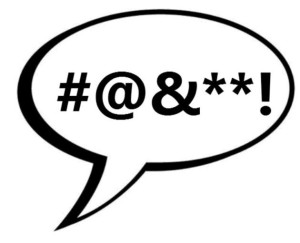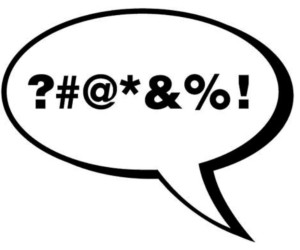Dear all,
I have been following campus discussions on the use of language and appropriateness of language with animated interest. This epistolary conversation follows my own interest in the relation between languages, and giving space to the grotesque in languages and cultures. I hope I am not read as a holier-than-thou preacher or as a new advocate of a new censorship (“intolerance” as they say) through this article. We have the revered and loved IIT Lingo that is a set of words and abbreviations that are unique to each IIT. They are interesting identity markers and they lend an aura of casualness in the strict limitations of academics. However, of late I am observing a move from the “lingo” to a more unpleasant-on-the-ears kind of public usage of cuss words. To my mind, there is something that still lurks between the official and the unofficial. There is something which is allowed and in fact encouraged in hostel and our room premises, but we tend to leave those words and terms in hostels and our individual chat rooms as we go to our labs, offices, and public places. This article emerges from anguish and from a concern regarding the use of cuss words in ‘official’ spaces.
This article emerges from anguish and from a concern regarding the use of cuss words in ‘official’ spaces.
Yesterday as I was about to start discussions in my class, the moment I turned around to face the white-board, I encountered this statement clearly etched out on the white board: “Maths is Fucking Awesome”. I have been coming across the use of expletives in many other social and individual contexts in different campuses. They have defined the freedom and autonomy of students. While I deeply admire and respect the sentiments of freedom of speech, of anonymity, and of creative dissent, I could not resist getting into an animated conversation with my class for a while regarding the appropriateness of cuss words and if it is alright to be using these words as a part of public display of our emotions. Why not? They are also a part of language and a way of expressing our anger and frustration. Why not? These words make us sound bold and cool. Why not? After all, our movies Delhi Belly, No One Killed Jessica, Mardaani… all use words that are fucking awesome! While using the word fucking in this article (believe me I am doing this for the first time in any article I have written so far), I felt my adrenaline rush, it gave me a high as it perhaps does for other users. In fact, I have been wondering, does that make me sound cool and sexy? This point reminds me of a similar conversation I had with a scholar years ago. The scholar insisted that in order to be called an intellectual you should be a social drinker. My rebuttal was “if I have to take to drinking as a personal choice, I might go for it but if I have to get a licence to be called an intellectual only through drinking, I rather not be branded as an intellectual”. Perhaps, expletives usage is one such intoxication. The more we use them, the more we want to use these words in both written and spoken diktats. We never know at what point of time, the words that sounded cool during college days, might brand us as abusers in the long run, when we use the same words against our wife/husband, children, friends, or colleagues. At that point of time, we might regret the same words that once made us feel proud about ourselves and gave us a high. Such is the ambiguous role of language.
across the use of expletives in many other social and individual contexts in different campuses. They have defined the freedom and autonomy of students. While I deeply admire and respect the sentiments of freedom of speech, of anonymity, and of creative dissent, I could not resist getting into an animated conversation with my class for a while regarding the appropriateness of cuss words and if it is alright to be using these words as a part of public display of our emotions. Why not? They are also a part of language and a way of expressing our anger and frustration. Why not? These words make us sound bold and cool. Why not? After all, our movies Delhi Belly, No One Killed Jessica, Mardaani… all use words that are fucking awesome! While using the word fucking in this article (believe me I am doing this for the first time in any article I have written so far), I felt my adrenaline rush, it gave me a high as it perhaps does for other users. In fact, I have been wondering, does that make me sound cool and sexy? This point reminds me of a similar conversation I had with a scholar years ago. The scholar insisted that in order to be called an intellectual you should be a social drinker. My rebuttal was “if I have to take to drinking as a personal choice, I might go for it but if I have to get a licence to be called an intellectual only through drinking, I rather not be branded as an intellectual”. Perhaps, expletives usage is one such intoxication. The more we use them, the more we want to use these words in both written and spoken diktats. We never know at what point of time, the words that sounded cool during college days, might brand us as abusers in the long run, when we use the same words against our wife/husband, children, friends, or colleagues. At that point of time, we might regret the same words that once made us feel proud about ourselves and gave us a high. Such is the ambiguous role of language.
At that point of time, we might regret the same words that once made us feel proud about ourselves and gave us a high. Such is the ambiguous role of language.
As someone who teaches Literature and at times Language to students, this overwhelming use of cuss words in college corridors, classrooms, television shows, sounds plain awkward to my ears. Maybe I come from an old school of thought, with an idea that if I have to kill someone, I have to know my language well and I have to write better. I do not subscribe to the view of the formal reducing itself to the level of ludicrous without achieving any purpose. At the risk of sounding pedantic, I beg to cite a few pieces of writing. In conventional British literature studies, there is an age called the Age of Satire (eighteenth century), led by people like John Dryden and Alexander Pope, with biting satirical pieces like Absalom Achitophel and Rape of the Lock that satirised the functioning of the British monarchy and other socio-cultural aspects of their time. However, there is not a single fuck or f*** (whatever form you may choose) word in there. They shook the foundations of the British monarchy with just one or two long satirical pieces. Mahatma Gandhi’s writings can be looked at as pieces of high quality satire; Hind Swaraj is an excellent example in this context. Gandhi can be fucking awesome or he can be simply brilliant. The choice of words and expressions is ours, but the reception of the reader or the listener is their own. Take another example of the poet named P. B.  Shelly who was expelled from Oxford because of a 13 page pamphlet Necessity of Atheism. Legends say, Shelly scared the s*** out of Oxford (or may we say “Shelly antagonised Oxford in an unprecedented example of satire”?), without using even one cuss word, so far that he had to be expelled from college. My point through these instances is that if cuss words do not serve any purpose in written or spoken form in official premises, do we really need to use them? There is a thin line of demarcation between trivialising and critiquing, and sadly, I am getting the vibe of an abject trivialising through the use of expletives in many Indian academic campuses, than actually helping us to develop an original critique. We are learning to acquire a few terms, a few theories, a few linguistic and cultural insights in bits and pieces, and instead of getting intrigued by the need for more, we land up being satiated by these crumbs and use them to our own sweet purposes. Seems as if our society needs par-blind intellectuals who can see only one side of the moon, so that generation after generation we live with similar intellectual and spiritual parasitic tendencies, depending on other parts of the world to provide us nourishment instead of developing our own path.
Shelly who was expelled from Oxford because of a 13 page pamphlet Necessity of Atheism. Legends say, Shelly scared the s*** out of Oxford (or may we say “Shelly antagonised Oxford in an unprecedented example of satire”?), without using even one cuss word, so far that he had to be expelled from college. My point through these instances is that if cuss words do not serve any purpose in written or spoken form in official premises, do we really need to use them? There is a thin line of demarcation between trivialising and critiquing, and sadly, I am getting the vibe of an abject trivialising through the use of expletives in many Indian academic campuses, than actually helping us to develop an original critique. We are learning to acquire a few terms, a few theories, a few linguistic and cultural insights in bits and pieces, and instead of getting intrigued by the need for more, we land up being satiated by these crumbs and use them to our own sweet purposes. Seems as if our society needs par-blind intellectuals who can see only one side of the moon, so that generation after generation we live with similar intellectual and spiritual parasitic tendencies, depending on other parts of the world to provide us nourishment instead of developing our own path.
In the medieval times in European theory, we studied a beautiful phenomenon called the grotesque. However, the grotesque was practiced only in the carnival square not in the official spaces of even the medieval world.
I have been a regular on social network sites, and when I perch on one or the other site, I enjoy reading the conversation against courses, “profs”, “admin” and so on. In fact, I feel elated that students can actually raise their voice in a fearless, uncensored manner and can actually help in changing systems. However, of late when I read the comments on some of these sites, they sound downright popcorn-goonish to me. Social sites are places where our actions are observed by people who might covet for the place and the time that we are living in. Sadly when I perch on certain pages, I feel quashed to pulp, not by the brilliance, but by the abjection of language that many among us use in public spaces. In the medieval times in European theory, we studied a beautiful phenomenon called the grotesque. However, the grotesque was practiced only in the carnival square not in the official spaces of even the medieval world.
Indians have been a victim of linguistic imperialism for centuries, in the nineteenth and twentieth century by “British-English” and in the twenty-first century by Americanisation of English language. As someone who observes these phenomena closely, I feel helpless as a mute spectator watching the changes of our times and their times.
Therefore, as a teacher if I have ascribed in any form to the use of cuss words either in written or oral conversation, as a way of sounding cool, kindly accept my public apology.